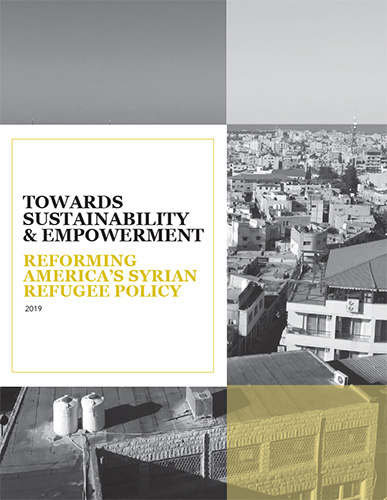Report: Toward Empowerment and Sustainability – Reforming America’s Syrian Refugee Policy
The number of refugees and displaced people worldwide has reached unprecedented levels. Of the world’s 68.5 million refugees and displaced people, by far the largest number are Syrian. The nearly 13 million Syrian refugees and internally-displaced persons account for sixty percent of Syria’s pre-war population.
While media coverage has focused on Syrian refugees seeking asylum in third countries, such as Europe and the United States, eighty percent of the seven million externally displaced Syrians have sought refuge in the countries neighboring Syria: Jordan, Iraq, Turkey, Egypt and Lebanon resulting in an enormous strain on government services and the local economies. As an influential player in Middle East politics, the United States has a national interest in sustaining the capacity of international systems to respond to protracted refugee crises.
Toward Empowerment and Sustainability: Reforming America’s Syrian Refugee Policies examines Jordan as a case study for informing U.S. Syrian refugee policy. Jordan’s experience exemplifies the myriad challenges facing neighboring countries that warrant a rethinking of America’s approach to the Syrian refugee crisis.
Four recommendations for government policy makers would contribute toward more sustainable and effective U.S. refugee policies:
- Increase U.S. aid to fund programs that empower refugees to be economically independent in their host countries rather than indefinitely dependent on international aid. Refugees unable to survive off of limited international and domestic subsidies are forced to take their sons out of school to work, borrow money from friends and family, and marry off their daughters at a young age.
- Use development aid to strengthen both state institutions and the private sector. A promising model is the Jordan Compact, an agreement between the Jordanian government and several European and international non-state actors launched in 2016.
- Fund humanitarian projects with need-based eligibility criteria not limited solely to Syrian refugees.
- Increase the number of Syrian refugees admitted into the United States. Less than 100 Syrian refugees were admitted in fiscal year 2018 as compared to 12,000 in 2017.
To read the full report, click here.








